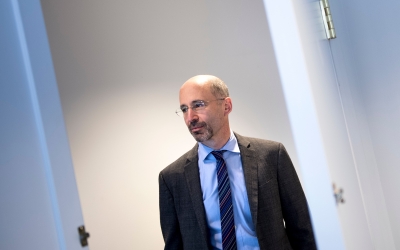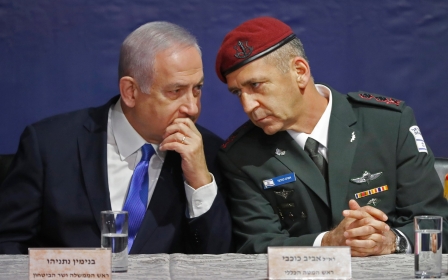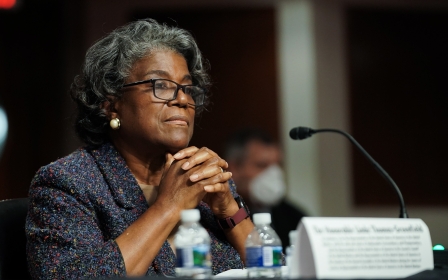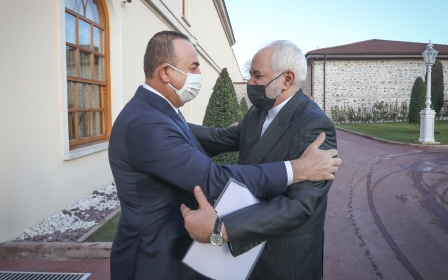Biden appoints Rob Malley as Iran envoy despite backlash from hawks

US President Joe Biden on Friday appointed Rob Malley as envoy for Iran in a move that signals Washington's willingness to engage with Tehran despite "who complies first" obstacles to a swift return to the nuclear deal.
White House spokeswoman Jen Psaki confirmed media reports of Malley's appointment at a news briefing on Friday.
A seasoned diplomat who was the chief US negotiator in talks that led to the 2015 nuclear agreement, Malley had faced opposition from conservatives and foreign-policy hawks since rumours of his nomination began to emerge last week.
"It's a positive sign from Biden - that he's really willing to revitalise American diplomacy. For too long, US foreign policy has been militarily very muscular, but diplomatically very weak," Sina Toossi, a senior research analyst at the National Iranian American Council (NIAC), told Middle East Eye.
Matt Duss, a foreign-policy adviser to Senator Bernie Sanders, lauded Biden for refusing to back down in the face of attacks against Malley's candidacy.
"Great news. There's no one better than Rob to make this policy succeed, which is why the hardliners didn't like the pick," Duss wrote on Twitter. "Also very good that Biden stood strong with this choice and disregarded their smear campaign. It won't be their last."
Malley served under former presidents Bill Clinton and Barack Obama in various capacities, including as an adviser to the campaign to defeat the Islamic State group, Middle East coordinator at the National Security Council, and special assistant to the president.
He currently leads the International Crisis Group, a think-tank focused on conflict resolution.
Khaled Elgindy, a senior fellow at the Middle East Institute, also praised the announcement, calling the nomination "great news".
"[Malley] is a highly skilled and thoughtful negotiator with extensive knowledge and an empathic disposition - literally the polar opposite of every member of the previous administration’s Middle East team of clowns," Elgindy said in a Twitter post.
Opposition campaign
Senator Tom Cotton, a staunch conservative, had led criticism against Malley, accusing him of being sympathetic to the Iranian government and having "animus towards Israel".
Malley, who could help reestablish channels of communication with Iran in his new role, does not require Senate confirmation.
Biden and his top aides have said that they intend to abide by the nuclear deal if Iran returns to full compliance with the agreement, then use the pact to launch further negotiations with Tehran for a "longer and stronger" accord.
The multilateral agreement, known as the Joint Comprehensive Plan of Action (JCPOA), saw Iran scale back its nuclear programme in exchange for lifting sanctions against its economy.
Former US President Donald Trump pulled Washington out of the pact in 2018 and launched a "maximum pressure" campaign of sanctions against Tehran.
In response, Tehran has loosened some of its commitments under the agreement by increasing uranium enrichment to pre-deal levels.
The Iranian parliament also passed a law to restrict UN inspectors' access to the country's nuclear facilities if US sanctions are not lifted by the end of February.
Reviving the JCPOA
Iran's Foreign Minister Mohammad Javad Zarif has called on the new US administrations to "unconditionally" dismantle sanctions, ruling out Iran's prior return to compliance.
So far, the US administration is sticking to its script that Iranian compliance must come before sanction relief - quite literally. Early on Friday, Psaki had to retrieve and read out notes and talking points in response to a question about a possible return to the deal.
"He [Biden] believes that through follow-on diplomacy, the US should seek to lengthen and strengthen these nuclear constraints and address other issues of concern, including Iran's ballistic missiles programme and its regional activity," Psaki said.
"But again, Iran must resume compliance with the significant nuclear constraints under the deal."
US National Security Adviser Jake Sullivan said the Biden administration was looking to address broader issues with Iran, including the Islamic Republic's ballistic missiles and what he called "recklessness" and "sponsorship of terrorism", but he stressed that restricting Tehran's nuclear programme remained a priority.
"From our perspective, a critical early priority has to be to deal with what is an escalating nuclear crisis as they move closer and closer to having enough fissile material for a weapon, and we would like to make sure that we reestablish some of the parameters and constraints around that programme that have fallen away over the course of the past two years," Sullivan said at a virtual appearance at the US Institute of Peace on Friday.
Toossi, of NIAC, said the "humiliations" that Iran had faced in recent years - including the US departure from the JCPOA, the killing of top Iranian general Qassem Soleimani and the assassination of nuclear scientist Mohsen Fakhrizadeh - make it difficult for the Iranian government to take the first step towards reviving the JCPOA.
He also stressed that it was Washington that nixed the deal, not Tehran. Iran is set to hold presidential elections in June.
"Biden is much better positioned to make a first overture, humanitarian overture, Covid relief, approving this IMF loan for $5bn, allowing Iran to access some of its frozen assets abroad to make medical purchases," Toossi said.
"That is a politically sellable thing. But for the Iranians, there has to be an understanding of how hostile the political situation there has become against negotiations with the US... for many legitimate grievances with the Trump era."
Middle East Eye propose une couverture et une analyse indépendantes et incomparables du Moyen-Orient, de l’Afrique du Nord et d’autres régions du monde. Pour en savoir plus sur la reprise de ce contenu et les frais qui s’appliquent, veuillez remplir ce formulaire [en anglais]. Pour en savoir plus sur MEE, cliquez ici [en anglais].







